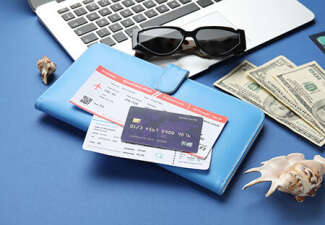The content on this page is accurate as of the posting date; however, some of the offers mentioned may have expired.
A credit card is a line of credit that allows you to borrow money to make purchases, transfer balances, and get cash advances, pay the borrowed money off (plus any interest you owe) at a later date, and borrow again. The cycle of borrowing and paying money off can be repeated as many times as you wish while your credit card account is active. When used wisely, a credit card can be an effective financial payment tool, and it's possible to enjoy the benefits that come with the credit card or result from using it.
Today you can have a physical, digital, and/or virtual credit card. Physical credit cards are pieces of plastic (or metal) with several features that help identify the cardholder and card issuer, along with other details to facilitate seamless transactions. The elements include:
- Issuer logo on the front or the back of the credit card.
- Payment network logo such as American Express, Discover, Mastercard or Visa logo on the front or back of the card.
- EMV chip on the front of the card that allows you to make point-of-sale purchases more securely.
- Contactless symbol that looks similar to a Wi-Fi symbol and allows you to tap your card to a compatible card reader.
- Magnetic stripe on the back of the credit card stores your credit card information.
- Your name and account number on the front or back of the card. The first figure of your card number also indicates which payment network your card runs on: 3 - American Express, 4 - Visa, 5 - Mastercard, 6 - Discover.
- Expiration date may be on the front or back of the card and shows the month and year when your card expires.
- CVV code is a three-digit number on the back of the credit card f you have Visa, Mastercard or Discover card. If you have an American Express card, it's a four-digit number on the front of the card.
- Customer service phone number on the back of the credit card, which you can call if you have questions or a problem with your account.
- Signature box on the back of the credit card where you sign your name.
Virtual and digital cards are stored on your phone and can be used to pay in stores or online. They have their own unique card numbers, expiry dates, and CVCs. A digital card is a copy of your physical bank card. Both, virtual and digital cards can be added to your digital wallet and can be used with Apple Pay or Google Pay. Virtual cards are usually disposable cards that can only be used once or for a limited time.
There are many types of credit cards. Typically, they are divided into two main types: secured and unsecured cards. Secured credit cards require you to pay an upfront security deposit, which serves as collateral if you miss a payment. Unsecured credit cards do not require a security deposit, and they typically offer better terms. The first type of credit card is usually for people with no or bad credit history. Whereas unsecured credit cards are usually for people with good credit. No matter which card you are considering, look for one with lower fees.
Credit cards are also divided into these types:
- Rewards credit cards: offer rewards in the form of cash back, points, or miles on your everyday purchases. They can even offer welcome bonuses, credits, or annual bonuses.
- Balance transfer credit cards: allow you to move a balance from another credit card and pay it off at an introductory 0% APR. This 0% intro APR promotion is limited in time and the promotional period can last anywhere from 6 to 21 months. Balance transfer credit cards usually require you to pay a balance transfer fee of 3% - 5% of the transferred amount.
- 0% intro APR credit cards: offer low introductory rates on new purchases made with your card. Promotional periods can last between 6 and 21 months. Some 0% intro APR credit cards may offer welcome bonuses and rewards.
- Student credit cards: designed for students, student credit cards allow cardholders to establish their credit history and possibly even earn rewards and get other benefits without a security deposit.
- Store credit cards: also called shopping credit cards or retail credit cards. These are issued in partnership with retailers and may offer retailer-specific rewards. Most retail credit cards can only be used with the co-branded retailer.
- Airline credit cards: much like store credit cards, but they are issued in partnership with airlines. Airline co-branded credit cards usually offer rewards, welcome bonuses, and airline specific benefits.
- Business credit cards: come with rewards and perks tailored to small business owners. Business credit cards usually have larger credit limits compared to personal credit cards, and they may help you establish a business credit history.
Some important credit card benefits at a glance:
- Credit cards can help you build better credit when you use them responsibly.
- Credit cards allow you to buy things and spread repayment out over time if you need to.
- Many credit cards offer rewards, such as cash back, miles, and points.
- If you lose your credit card, your personal liability for fraudulent charges on the credit card won't exceed $50, if you report it lost or stolen within 2 business days.
Some important tips for credit card holders
- When you use a credit card, it's not free money, but the money that you borrow from a bank. Therefore, you should treat your debts and spendings responsibly. Don't carry a balance, try to pay it off before the due date, or you will be hit by the late payment fee and in most cases have interest added to your balance.
- Try to improve your credit score. To do this, you need to make payments regularly. A good credit score gives you access to cards with better terms and conditions, the ones that let you save money or earn rewards.
- Keep track of your credit limit. Don't max out your credit card, try to increase your credit limit (if you don't have bad things on your credit report, a credit card issuer may increase your credit limit if you ask). A large credit limit may improve your credit score, because it affects your credit utilization ratio.
- Don't be afraid to apply for new credit cards - but only if you can manage them. More credit cards give you more cumulative credit limit, but if you have trouble keeping track of your debts, due dates and purchases, then fewer credit cards are better than a lot of debt. Be prudent and plan your moves well.
A good credit card may be a helping hand, providing you with a nice opportunity to improve your life and spending habits, making you more responsible and financially educated. If you are ready to apply for a credit card, look through our specially selected best credit cards.
If you are not sure where to start and need some help, we are there for you! Check out our tool that will show you suitable credit cards.






